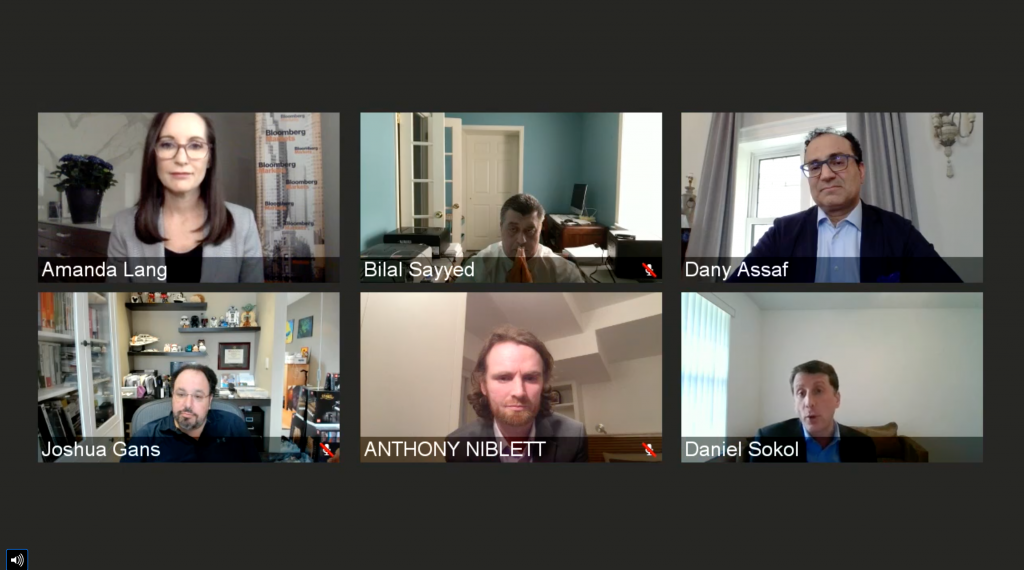Experts discuss issues of regulating Big Tech and its impact on news media
On March 30, Torys and the University of Toronto (U of T) presented “Big Tech Wars: What Lies Ahead,” a panel discussion on Big Tech and its implications on competition policy and journalism. Big Tech refers to major information technology companies such as Apple, Google, Amazon, Facebook and Microsoft.
The panel was moderated by the Faculty of Law’s Professor Anthony Niblett and Dany Assaf, partner and co-chair of the Competition and Foreign Investment Practice at Torys. The panel featured four experts from different industries affected by Big Tech: Amanda Lang (journalist at BNN Bloomberg), Bilal Sayyed (former Director, Office of Policy Planning, Federal Trade Commission), Daniel Sokol (Professor of Law, University of Florida Levin College of Law), and Joshua Gans (Jeffrey S Skoll Chair in Technical Innovation and Entrepreneurship, Rotman School of Business).

Professor Niblett kicked off the discussion by introducing one of the most common questions raised when discussing Big Tech — should Big Tech be regulated?
Sokol reframed the question, stating that regulation is inevitable, but we may ask how to go about regulating Big Tech without creating unintended consequences like increasing regulatory burdens and leading public companies to go private. He drew on examples from the UK and the European Union, which implemented the General Data Protection Regulation (GDPR) in 2018. Sokol noted, “it turns out that GDPR has had a negative impact on competition. I’m not saying privacy is bad, I’m simply saying there are a set of trade-offs and I’m not sure people anticipated these trade-offs.”
Lang added that we must ask at what level should regulation happen. In reference to free competition, she asked “why should a company own the platform and compete with its service providers on that platform?” Sayyed commented that rather than legislate, it would be better to first analyze whether the conduct or structure of these Big Tech companies are even harmful to consumers, arguing that the harms seem “mainly speculative.”
This drew debate from the panelists on the impact of Big Tech companies. While their existence raises concerns of monopoly power and stifling innovation, they have also become integrated in our society.
On the topic of stifling competition, Gans noted that while Microsoft is one of the biggest monopolists, they’re often not even considered as such.
“Microsoft, now, is what we want from these [Big Tech] companies,” Gans noted. Unlike some other companies, Microsoft doesn’t engage in blocking tactics that stifle competition and actually offers competitive products.
Conversely, Lang highlighted Amazon’s Marketplace as an example of “literally stifling and killing competition.” Assaf brought up the diapers.com controversy in which Amazon engaged in possible anti-competitive behaviour, asking if companies would continue to participate in Amazon’s Marketplace if they knew their data would be used against them in Amazon’s own entry strategy.
Sayyed brought in an interesting perspective that this kind of behaviour is not restricted to Amazon and other Big Tech companies. When shopping at the grocery store, he noticed a lot of store-brand products were inspired by products that gained popularity at that store. Lang countered that it is the dominance of the platform that is the difference; there are many grocery stores, but there is only one Amazon.
“Are they so big that their natural competitive behaviour becomes anti-competitive?” Lang asked.
The conversation then shifted to discussing the future of news media in the presence of Big Tech. Lang explained that journalism’s principle advertising-based business model no longer works. But while that is exacerbated by Google’s ability to advertise using their content, traditional media’s model was already failing.
Professor Niblett brought up how Facebook temporarily banned news pages from their platform in Australia, which had major effects on Australia’s media industry. This was in response to a proposed governmental move to require Facebook to pay big news outlets to be on their platform. To Gans, this looked like a way for one big company to extort money from another.
Gans acknowledged the power these companies had to control access to information but stated that rather than Google and Facebook taking the content away, they generally introduce more competition. They make it easier to find outlets outside of mainstream media. Lang argued the issue is that journalists are competing with themselves — it is their content that is being advertised on Facebook and Google, who pocket the revenue.
Sokol likened these platforms to “the world’s biggest digital billboards.” It may not be preferable but they are the dominant way to get information out into the world. The issue is figuring out a way to properly compensate content creators who are generating this value.
Overall, the panel discussion shed light on the many problems associated with Big Tech, and the complexities involved in solving them. Since Big Tech is staying for the foreseeable future, it is more important than ever to not only address these questions but bring them to the public light.





